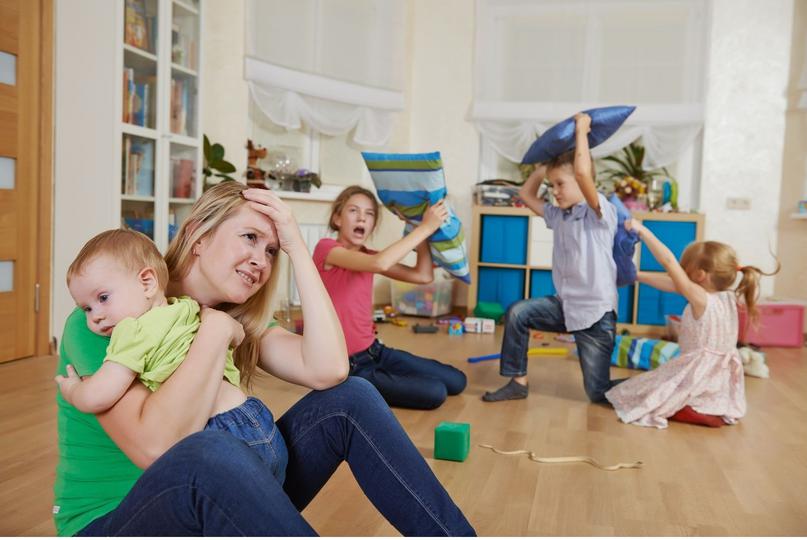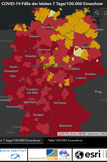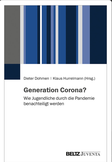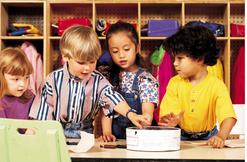Regulation chaos in schools: schools closed until the end of January - or not
Update of the regulations on school teaching now online (as of 8.1.2021, 21h)
At first glance, the Chancellor and the state premiers had decided on a clear regulation on Tuesday: "Schools will remain closed until the end of January". But shortly afterwards, all this no longer applied and the first federal states began to introduce their own and other regulations. Here we give an overview of the current status for all states.

School closure or not?
Here we summarize the regulations of the individual federal states (status: 8.1.2021, 21h)
Baden-Württemberg
Elementary schools: Schools remain closed for the time being. Baden-Württemberg aims to reopen day-care centres and schools from 18 January, depending on the pandemic situation.
Secondary Schools: Face-to-face classes for secondary school students will be suspended until the end of January. Distance learning will be offered. Unlike for primary schools and final-year classes, there appears to be no corresponding stipulation for secondary schools that they will reopen from 18 January. The schools will decide individually whether final-year classes will be offered face-to-face classes in addition to distance learning in order to prepare for the exams.
Bavaria
Elementary Schools: There will be no face-to-face classes in the elementary school initially until Jan. 29, 2021. The carnival holidays are cancelled, interim report cards are now available on 5 March
Secondary schools: There will be no face-to-face classes in secondary schools initially until 29 Jan 2021. The carnival holidays will be cancelled, mid-term reports will now be given on 5 March. There will be special arrangements for graduating classes and final exams will be postponed.
Berlin
Elementary schools: as of 8/1/2021 6 p.m., elementary schools will continue with the current distance learning at least until 1/24/2021.
Secondary schools: As of 8.1.2021 18h, as of next Monday there will only be attendance classes (without compulsory attendance) with a maximum of half classes at the secondary schools for the final classes 10, 12 and 13. For all other pupils it remains until 24.1.2021 with distance learning.
Brandenburg
Elementary Schools: There will be no face-to-face classes in the elementary schools initially until Jan. 22.
Secondary Schools: Until the end of January, face-to-face classes for students in secondary schools will be suspended at least until Jan. 22. There will be special arrangements for final-year classes and special schools.
Bremen
Elementary Schools: There will be a transition week the week of January 11: Grades 1 through 6 may participate in face-to-face classes, but attendance is suspended until the end of the month. Class attendance is still recommended for grades 1-6.
Secondary Schools: Beginning January 11, there will be an effort to alternate face-to-face and distance learning for grades 7 through 9. There will be special arrangements for final year classes.
Hamburg
Primary schools: In primary schools, there will initially be no face-to-face teaching, but distance learning.
Secondary Schools: Face-to-face classes for students in secondary schools will be suspended until the end of January. There will be special arrangements for graduating classes.
Hesse
Primary schools: Initially, there will be no face-to-face teaching in primary schools.
Secondary Schools: Face-to-face classes for students in secondary schools will be suspended until the end of January. There will be special arrangements, such as face-to-face teaching, for final-year classes.
Mecklenburg-Western Pomerania
Primary schools: Initially, there will be no face-to-face teaching in primary schools. It is planned to have face-to-face teaching from 18 January if the incidence value is below 50 in a district or an independent city.
Secondary schools: There will initially be no face-to-face teaching in secondary schools. Classes 5 to 6 are expected to receive face-to-face teaching from 18 January if the incidence value in a district or independent city is below 50. Graduating classes are the exception and are expected to receive face-to-face instruction again as of January 11.
Lower Saxony
Primary schools: Initially, there will be no face-to-face teaching in primary schools. Children will be given materials to learn. Emergency care will be provided. As of January 18, elementary and special education students will go into a rotation model and will be taught in divided classes.
Secondary Schools: Face-to-face classes for students in secondary schools will be suspended until the end of January. There will be special arrangements for graduating classes.
North Rhine-Westphalia
Primary schools: Initially, there will be no face-to-face teaching in primary schools.
Secondary Schools: Face-to-face classes for students in secondary schools will be suspended until the end of January. There will be special arrangements for final year classes. Written examinations and exams in grades Q1 and Q2 as well as in grades 12 and 13 at vocational grammar schools and in final-year classes will be made possible.
Rhineland-Palatinate
Primary schools: There will be no face-to-face classes in elementary schools for the time being. From 25 January at the earliest, classes are to go into alternate teaching, if the infection situation permits.
Secondary Schools: Face-to-face classes for students in secondary schools will be suspended until the end of January. From 25 January at the earliest, classes 5 and 6 are to go to alternating classes, if the infection situation permits this. For graduating classes, there will be the option of 2x per week in face-to-face classes starting January 18. From 25 January at the earliest, grades 5 and 6 are to go into alternate instruction if the infection situation permits.
Saarland
Primary schools: Initially, there will be no face-to-face teaching in primary schools.
Secondary Schools: Face-to-face classes for students in secondary schools will be suspended until the end of January. There will be special arrangements for graduating classes; they are to return to staggered attendance classes as early as January 11. For graduating classes there is
Saxony
Primary schools: Initially, there will be no face-to-face teaching in primary schools.
Secondary Schools: Face-to-face classes for secondary school students will be suspended until the end of January. There will be face-to-face classes for final year students from 18 January.
Saxony-Anhalt
Primary schools: Initially, there will be no face-to-face teaching in primary schools.
Secondary Schools: Face-to-face classes for students in secondary schools will be suspended until the end of January. There will be special arrangements for graduating classes.
Schleswig-Holstein
Primary schools: Initially, there will be no face-to-face teaching in primary schools.
Secondary Schools: Face-to-face classes for students in secondary schools will be suspended until the end of January. From 11 January, final-year classes are expected to receive learning and preparation in attendance.
Thuringia
Primary schools: Initially, there will be no face-to-face teaching in primary schools.
Secondary Schools: Face-to-face classes for students in secondary schools will be suspended until the end of January. There will be special arrangements for graduating classes.
Only meetings with a maximum of one other person allowed - this does not always apply to children
Unlike before, in future you may only meet with a maximum of one person who does not belong to your own household. This is a severe restriction compared to the previous regulation. In principle, the special regulations for children have also been abolished. Previously, they were not counted, but this no longer applies as of 10.1. unless there are special regulations specific to the country (see below). I.e. in most countries children are only allowed to meet a boyfriend or girlfriend.
This does not apply to the countries:
Baden-Württemberg: Children under 14 are not counted.
Bavaria: Children under 3 years of age are not counted.
Berlin: In the case of single parents, their children up to the age of 12 are not counted.
Bremen: Children up to 14 years are not counted.
North Rhine-Westphalia: Children from the "other" person's own household are not counted.
Schleswig-Holstein: Children under the age of 15 who are looked after by family members, as well as relatives in need of care, are exempt from this rule.
Saxony-Anhalt: Private meetings are limited to 5 persons from one's own household and one other household. Children up to 14 years are excluded from this rule, i.e. they are not counted.
Are the children allowed to meet their friends?
In future, children will only be allowed to meet one boyfriend or girlfriend. In Baden-Württemberg, Berlin, Bremen, North Rhine-Westphalia, Saxony-Anhalt and Schleswig-Holstein, the following exceptions apply:
Baden-Württemberg: Children under 14 are not counted in the contact restrictions.
Bremen: Children up to 14 years are not counted in the contact restrictions.
North Rhine-Westphalia: Children from the "other" person's own household are not counted in the contact restrictions.
Schleswig-Holstein: Children under the age of 15 who are looked after by family members, as well as relatives in need of care, are excluded from this rule and are not counted.
Saxony-Anhalt: Private meetings are limited to 5 persons from one's own household and one other household. Children up to 14 years are excluded from this rule, i.e. they are not counted.
According to the current state of information, the other regulations are still valid. We list them here again for the sake of completeness:
Emergency care in daycare centres and schools
Emergency care is available in all countries. The details of who is eligible for emergency care are determined by the Länder and are therefore not listed in the resolution. You can find the regulations of the individual federal states here.
It is obvious that this will mainly apply to parents who still have to work "normally" at the workplace and/or belong to the so-called care-relevant sector.
Expansion of the number of children's sick days
For parents who have to look after their children at home due to daycare and school closures, the number of so-called children's sick days is increased by 10, for single parents by 20 days. This means that in this case, the health insurance fund will cover part of the loss of earnings costs. However, the reimbursement amount does not correspond to the full net wage, but is lower.
Further possible help for parents
Unlike in the spring, the agreements contain a few formulations that are intended to make it somewhat easier for parents to reconcile family and career. However, it is debatable whether the proposed measures are sufficient.
On the one hand, employers are asked to allow home offices as far as possible and flexible. For all companies that have to close anyway, these proposals are not a problem. In many other cases this will not be possible. This is all the more true as no compensation payments have been named and it is unclear whether this can be absorbed within the framework of bridging aid. What you can do to deal with this situation aggressively is described here.
Furthermore, additional opportunities are to be created for parents to receive paid leave for looking after children during the period in question. The proposal for paid leave is certainly helpful for parents. However, it unfortunately remains unclear how the employer is to be compensated for this, if necessary, and how the associated costs are to be absorbed.
So what happens after January 31, 2021?
The agreed regulations will initially apply until 31 January 2021, after which the Federal Chancellor and the Minister Presidents of the federal states will decide on 25 January. If one follows the statements of individual participants in the press conference following the meeting, then there will probably still be restrictions after 31 January. What these are will depend on the incidence of infection at the end of January.
State sovereignty
It is also important that the federal states are responsible for the concrete implementation and can adapt the regulations within the framework of the agreements. Our website Corona-was-darf-ich provides information about the further regulations in the federal states.
Published on
Topics
Articles on the topic
-
How do I find a school place for my child?
Depending on the state and type of school, different things need to be...

-
Childcare - how does it work in Germany?
The path from application to daycare place is simple and complicated at...

-
Controversy: open schools or close schools?
Politicians should react now to slide unprepared into a forced closure....

-
Corona pandemic severely disadvantages children and young people - but there is no "Corona generation"
This is a core finding of the anthology "Generation Corona? How young...

-
What to do after the Easter holidays? - Part 2: Final exams
An overview of the regulatory diversity

-
Kitas and schools in a state of flux
Update from 9.4.2021 on the current regulations
